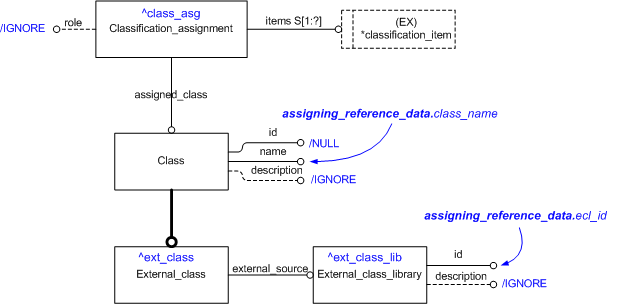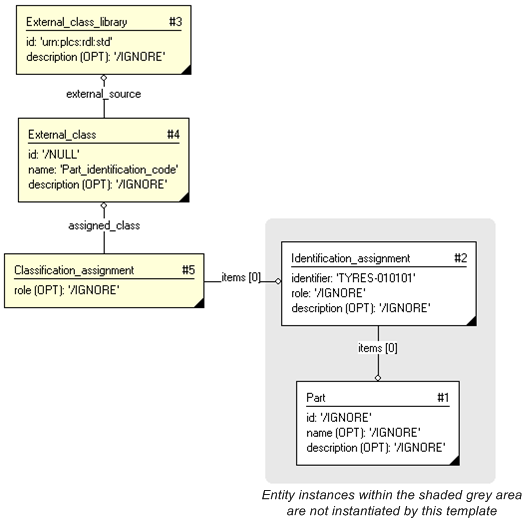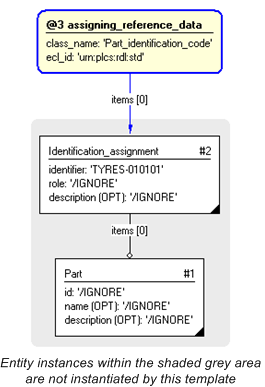
| Template:— assigning_reference_data (asg_rd) Capability:assigning_reference_data |
Date: 2009/06/10 09:22:49 Revision: 1.30 |
This section specifies the template assigning_reference_data.
NOTE The template has been defined in the context of the capability assigning_reference_data which provides an overall description of the relevant parts of the ISO 10303-239 information model and a description of related templates.
NOTE An explanation of a template and the associated instantiation path is provided in the Template overview section.
This template describes the classification of something as being a member of a class, where the definition of that class is defined in a given external Reference Data Library (RDL).
This template illustrates the most simplified assignment of reference data, where:
NOTE There is also a template for assigning codes for classification to entity instances in a data set (assigning_code). The usage of the assigning_code template applies when the assigned code isn't defined as a class within a Reference Data Library.
NOTE For DEXlib edition 1, this template is also used for representing 'Same_as' associations between entity instances in a data set and individuals in a Reference Data Library. 'Same_as' means that an entity instance in a data set represents the same thing as the individual defined in the RDL. The use of this template for 'Same_as' associations will be superseded in DEXlib edition 2 by the use of the new 'Same_as_identification' entity and its associated template.
NOTE For DEXlib edition 1, the External_class.name attribute is populated with the name of the class being referenced in an RDL, and the External_class_library.id attribute identifies the RDL where this class is defined. This will be superseded in DEXlib edition 2, where the External_class.id attribute will be populated with the full HTTP URN identifying the source where the class is defined (RDL and class name), and the External_class_library.id attribute will identify the context onthology for an actual data exchange.


target
is the parameter to which the
External_class
is bound.
target
is the parameter to which the
External_class_library
is bound.
target
is the parameter to which the
Classification_assignment
is bound.
| Entity in path | Value | Inherited from |
| Classification_assignment.role | '/IGNORE' | — |
| External_class.id | '/NULL' | Class.id |
| External_class.description | '/IGNORE' | Class.description |
| External_class.name | @class_name | Class.name |
| External_class_library.id | @ecl_id | — |
| External_class_library.description | '/IGNORE' | — |

#1=PART('/IGNORE', '/IGNORE', '/IGNORE'); #2=IDENTIFICATION_ASSIGNMENT('TYRES-010101', '/IGNORE', '/IGNORE', (#1)); #3=EXTERNAL_CLASS_LIBRARY('urn:plcs:rdl:std', '$'); #4=EXTERNAL_CLASS('/NULL', 'Part_identification_code', '/IGNORE', #3); #5=CLASSIFICATION_ASSIGNMENT(#4, (#2), '/IGNORE');

© OASIS 2010 — All rights reserved